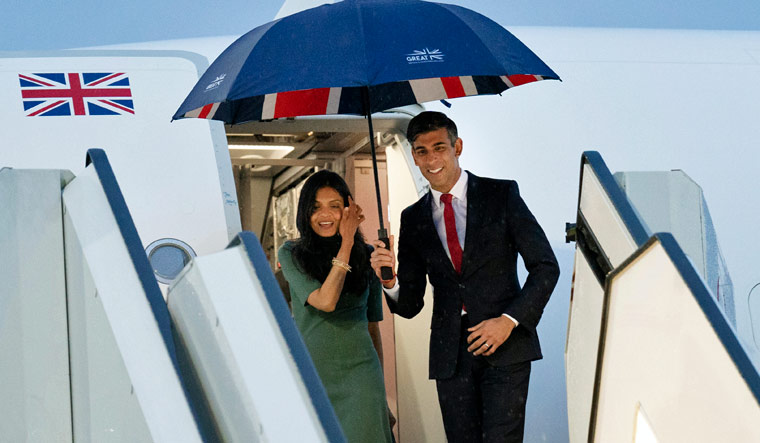British Prime Minister Rishi Sunak and his wife Akshata Murty arrived in Japan on Thursday for the G7 Summit, on the sidelines of which he clinched a new so-called Hiroshima Accord for greater UK-Japan economic, security and technology collaboration.
This new UK-Japan global strategic partnership is being seen as a counterbalance to Chinese dominance in the region and also includes a Semiconductors Partnership to pursue ambitious R&D cooperation and skills exchange to bolster supply chain resilience in the key sector.
The UK also confirmed that its Carrier Strike Group (CSG) warship will return to the Indo-Pacific in 2025, following a maiden voyage to the region including India in 2021, as Sunak became the first British Prime Minister to visit Hiroshima the site of the Second World War atomic bombing.
It is a privilege to be visiting Tokyo and Hiroshima at this historic moment in the United Kingdom's relationship with Japan, the British-Indian leader said.
Prime Minister [Fumio] Kishida and I are closely aligned on the importance of protecting peace and security in the Indo-Pacific and defending our values, including free and fair trade. The Hiroshima Accord will see us step up cooperation between our armed forces, grow our economies together and develop our world-leading science and technology expertise. It marks an exciting next phase in the UK and Japan's flourishing partnership, he said.
The Hiroshima Accord will cover agreements on defence, trade and investment, science and technology collaboration, and joint work on tackling global issues like climate change.
Downing Street said Japan's pivotal role in the Indo-Pacific makes strong relations with the nation central to the UK's security and prosperity.
In Tokyo, Sunak visited a naval base to confirm new UK-Japan defence cooperation which includes doubling UK troop numbers in upcoming joint exercises and agreeing on a formal Consult Clause, whereby the UK and Japan commit to consult each other on important regional and global security issues and consider measures in response.
The CSG fleet, consisting of an aircraft carrier, escorts and aircraft, to be deployed in 2025 will work alongside the Japanese Self-Defence Forces and other regional partners to help defend peace and stability in the Indo-Pacific, Downing Street said.
Meanwhile, it was also announced that leading Japanese businesses have committed to invest almost GBP 18 billion in businesses and projects across the UK.
These new investments are a massive vote of confidence in the UK's dynamic economy, from some of Japan's top firms. Working with the government and British industry they will create the kind of high-quality, reliable jobs and transformative local investment we are delivering around the country, said Sunak.
The British prime minister added that the sky's the limit for British and Japanese businesses and entrepreneurs as bilateral trade ties grow, including through the Japan-included Comprehensive and Progressive Agreement for Trans-Pacific Partnership (CPTPP) trade bloc which the UK had joined recently.
According to official statistics, Japan is the UK's fifth largest investor with GBP 92 billion invested in the UK, and trade in goods and services was worth GBP 27.7 billion last year.
The new investments announced this week include funding for offshore wind, low-carbon hydrogen and other clean energy projects from Japanese trading house Marubeni.
Mitsubishi Estate and Mitsui Fudosan, two of the largest real estate companies in Japan, confirmed plans to invest in affordable housing, high-quality office space and a life-science laboratory in the UK.
While Sumitomo Corporation intends to expand its UK offshore wind projects, Sumitomo Electric Industries has also announced its decision to build a strategically important high-voltage cable manufacturing plant in the Scottish Highlands.
The UK and Japanese governments also unveiled a new Renewable Energy Partnership, which includes building business partnerships to accelerate the deployment of clean energy. PTI AK AKJ FZH 05181644


